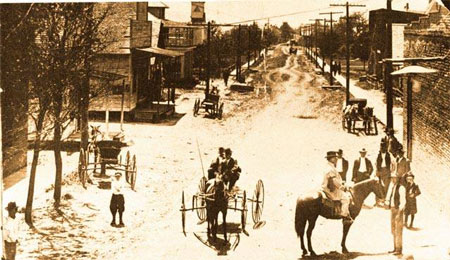
Getting into the small village of Cumby is a destination itself. It’s tucked away along state highway 499 between Interstate 30 near Sulphur Springs and the town of Campbell. It is situated on one of the oldest roads in all of East Texas.
But Cumby wasn’t always the quiet little village it is today. It wasn’t even Cumby. In the 19th century it was Black Jack Grove, a well-known spot on cattle trails to Jefferson, Beaumont, Opelousas, Lafayette, and on to New Orleans. In a time without cotton, settlers grazed cattle on the tall grass prairies of Northeast Texas. About once a year, the drovers rounded up the herd, culled the steers, branded them, and drove them off to market. The owner usually went with the herd, but young white men and slaves did the arduous work.
Frederick Law Olmstead described the process in detail in his work, A Journey Through Texas. Once the herds reached Black Jack Grove, the drovers celebrated the distance they traveled and prepared for the long road ahead. Large quantities of booze were consumed in Black Jack Grove. The Civil War slowed down the cattle drives but did not completely eradicate them.
After the War, immigrants from other Confederate states arrived in Texas, looking for new homes and a new start. Black Jack Grove was a stopping point. As cotton became a legitimate commodity, Black Jack Grove continued its sociability. In the late 1890s prohibition became the issue of the times. It was a convoluted argument, especially when members of the Women’s Christian Temperance Union tried to involve themselves with male organizations. Suffrage for women was not a popular subject in Texas or anywhere in the South.
A temperance vote in Black Jack Grove stopped bars from serving alcoholic beverages in town. All but one establishment closed. That became a “Blind Tiger”, a Southern term for speakeasy. The virtuous ladies, young and old, decided to put it out of business. A group of women marched down the main street with axes, hatchets, and other means of destroying the business. When the attack began, one of owners was inside. He jumped out a window into the local lumber yard where he found a good hiding place.
The females destroyed the building, broke every bottle of liquor and ended the alcoholic beverage supply in Black Jack Grove for a long time. The women were each charged one dollar for trespassing, but agreeingly paid the fine.
A little earlier a private school was established in Black Jack Grove by Joshua Crawford, brother-in-law of U. S. Congressman John Sheppard. The congressman taught his son to read before school age. Crawford established a school that emphasized reading as well as Classical Languages. Congressman Sheppard enrolled his oldest son John Morris who studied Greek and Latin under Professor De Lyons from Yale University. The Professor moved to Austin in 1888. Morris Sheppard moved with the couple. Sheppard continued his education with emphasis on literature and speaking.
Sheppard earned a law degree, set up a practice, and in 1902 when his father died, he became Congressman from that part of Texas. In 1912 he was elected senator from Texas, an office he retained until his death in 1941. Sheppard became known as the Senator who wrote the 18th Amendment to the U. S. Constitution, creating prohibition throughout America.
Yet, I have never heard anyone from Black Jack Grove, now named Cumby, mention Morris Sheppard. But stories abound about the women who razed the Blind Tiger.
While the good ladies of Black Jack Grove probably didn’t dress is all-white, they certainly carried their axes and hatchets with pride. (MPR News)
